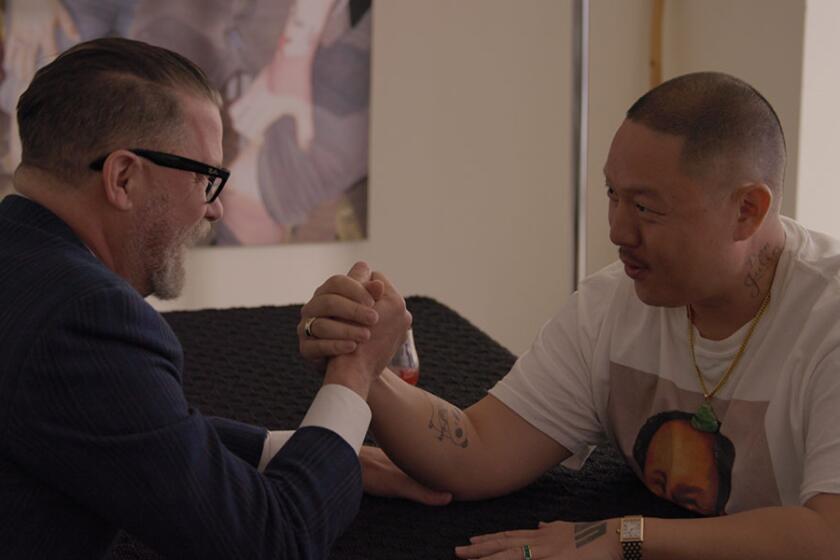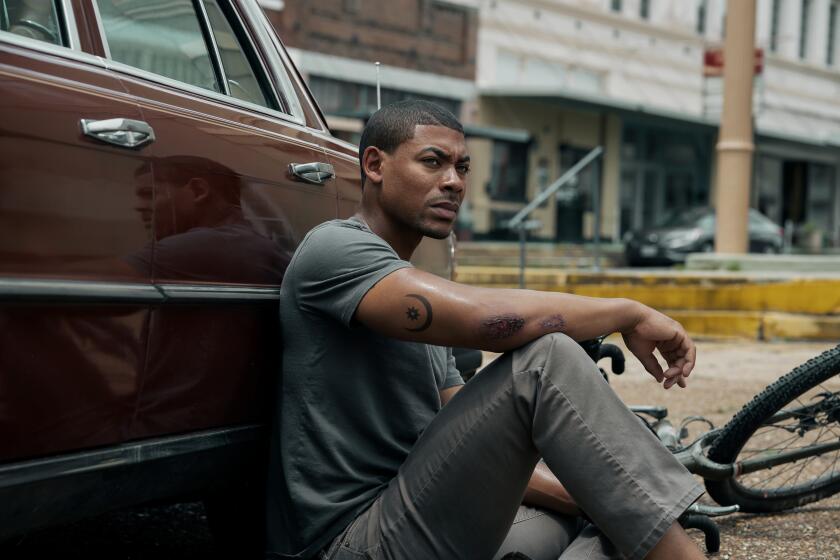Chiwetel Ejiofor delves into a serious exploration of faith and spirituality for Netflix’s ‘Come Sunday’
Reporting from London — “For somebody to fundamentally change their mind is the hardest thing,” says Chiwetel Ejiofor, reflecting on his new film, “Come Sunday.” The movie, which premiered at this year’s Sundance Film Festival and is now streaming on Netflix, stars Ejiofor as a real-life religious figure, Bishop Carlton Pearson, who shook the church when a message from God urged him to shift his beliefs about the existence of hell.
“You hope it for people,” the actor adds. “But it’s so difficult to do, especially after a certain point. You can amend things, but to fundamentally change what you think or feel about is probably the hardest thing. So somebody who does go through a fundamental, psychic, spiritual change is really interesting.”
“Come Sunday,” directed by Joshua Marston, is based on a 2005 episode of “This American Life” and follows a short span in Pearson’s life in the late ’90s, when he went from leading a massive church in Tulsa, Okla., to being deemed a heretic. The film raises grandiose questions, considering what it means for a religious person to decide that there’s no such thing as judgment in the afterlife. It deals with discussions and questions that Ejiofor hadn’t necessarily considered before embarking on a year’s worth of research.
“It’s a lot to think about,” he notes, sitting over lunch at London’s Hotel Café Royal. “To play somebody who has very literal beliefs that I have personally never investigated in that way myself. And how you would go about not believing those things — it seemed like a massive shift of somebody’s conscious thought. I hadn’t seen anything quite like it in terms of analyzing a moment and drawing on that moment to discover or think about a whole host of things.”
Ejiofor was raised Roman Catholic and attended church and Sunday school as a child in London, but he never really engaged with religious outside of an intellectual curiosity. He’d read large parts of the Bible as a teenager, mostly because he was fascinated by the idea of the end of the world, but it wasn’t until the actor took on “Mary Magdalene” (an upcoming drama starring Joaquin Phoenix and Rooney Mara from “Lion” director Garth Davis) and “Come Sunday” in succession that he really revisited the idea of faith.
The preparation for both films overlapped (“Mary Magdalene” was shot at the end of 2016, “Come Sunday” in early 2017), and Ejiofor re-read the Bible on planes ahead of shooting. He also visited churches in Pearson’s hometown of Tulsa, as well as Atlanta, where “Come Sunday” was shot, and, along with Marston, engaged in discussions with religious scholars about the nature of hell.
“I had some understanding of church,” the actor notes. “But I didn’t engage in faith, exactly, or spirituality at all. I always found it very surface level and I never really investigated it further. It was never presented to me as literal or real. Or if it was presented to me in that way, I didn’t perceive it that way. It really wasn’t until engaging with these projects that I ever really looked at it from that perspective. I walked away with a new respect for [faith], and I think I gained a lot of perspective and understanding. I got an admiration for people who really engage with faith in its purest form and live lives according to that.”
Pearson was involved in the production, spending time on set and meeting with the actors. Ejiofor, a theater-trained British actor who received an Oscar nomination in 2014 for “12 Years a Slave,” embraced the challenge of transforming into a Southern bishop very much unlike him.
It took the year of on and off research and numerous visits to the churches to really begin to feel Pearson in his body. Before visiting inclusion churches, Ejiofor had never heard of their existence, especially coming from Britain.
“The information one receives about the States, especially in the religious aspect, is pretty myopic,” he says. “The idea of having a church which has the crescent moon — an Islamic symbol — and a Christian symbol in Atlanta is simply not information I’d come across. But it wasn’t a surprise to anybody there. That’s the point of going and seeing it for yourself and figuring out what’s true for you.”
Neither Ejiofor nor Marston feels that “Come Sunday” was specifically made for religious viewers. On a deeper level, it’s about inclusion and why inclusivity is essential in all aspects of life, not just in Christianity.
“We had a number of conversations about theology, and he was very rigorous about doing research and speaking to people and reading,” Marston notes. “We were not simply telling the facts of what happened to Carlton Pearson, but also trying to bring to the screen, in a human form, some very weighty questions. I think it was very important for Chiwetel — and for me — that he be able to be in the head space of the character. He couldn’t just read the lines. He himself had to have wrestled with the same questions that Carlton Pearson had wrestled with.”
The film’s release on Netflix feels essential to its success, although Ejiofor doesn’t spend a lot of time thinking about distribution or viewing figures. “Mary Magdalene,” a Weinstein Co. production, doesn’t have a release date in the U.S., but the actor just shrugs and says, “I’m sure it will come out.”
For Marston, though, that “Come Sunday” will emerge directly into viewers’ home is important. “One of the values of Netflix is that all those people who are actually interested in this but who might not be able to publicly go to it or be seen walking into the movie theater can watch it in the privacy of their own home, which is great,” he says.
“I’ve always believed that, with anything, if you make it as good as it can be, people will come and see it,” Ejiofor adds. “They’ll find a way of doing that. But the idea that people have the opportunity to see projects that they might have had to travel further to see is appealing.”
The actor is working with Beyoncé and Donald Glover on Disney’s highly anticipated live-action remake of “The Lion King,” in which he plays Scar, and he recently finishing directing his first feature, “The Boy Who Harnessed the Wind,” in Malawi. He’s unsure when the latter will be released; in the meantime, he’s hoping to find his next theater project. For Ejiofor, the stage is the foundation of acting.
“I’ve spent most of my professional career either doing theater or waiting to do theater,” he says. “I always feel like it’s the best continual training as an actor. It’s the best way of understanding the craft of connecting with audiences and continuing to wrestle and work with characterization and dialogue and all of the things that are important in figuring how to be a better actor ... So far, I haven’t been bored at all with being an actor, finding out new things or trying to discover how to do it better.”
More to Read
Only good movies
Get the Indie Focus newsletter, Mark Olsen's weekly guide to the world of cinema.
You may occasionally receive promotional content from the Los Angeles Times.










